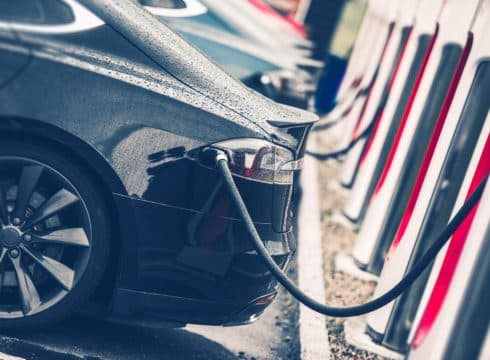The I-Pace series is expected to roll out six EVs in 2020
The company will also be launching other vehicles with hybrid engines
The EV I-Pace is part of JLR India to launch 10 new products in India by 2020
Inc42 Daily Brief
Stay Ahead With Daily News & Analysis on India’s Tech & Startup Economy
Looking at the current developments in the electric vehicle (EV) market, Tata Motors has decided to join the bandwagon with its subsidiary Jaguar Land Rover (JLR). The company plans to roll out six EV in India in 2020.
Jaguar’s first all-electric car, I-PACE series, is expected to launch in the second half of 2020. The company is also expected to launch a series of hybrid vehicles. The introduction of electrified vehicles in India under JLR ’s portfolio is in line with the government’s thrust towards EV.
“The company is encouraged by the introduction of FAME-II by the Government of India and it focuses on the expansion of the charging infrastructure in the country,” Rohit Suri, president and managing director JLR said in a press release of April 2019.
Ralf Speth, the global CEO of JLR, speaking at an event in the UK, also added that the I-PACE series has received an overwhelming response and the company is facing “capacity constraints”.
The CEO also added that JLR expects the supply situation will be challenging with battery shortage. Seth also said that the prices of EVs will remain high for at least the next six years.
JLR India is set to launch 10 new products in India by 2020. Out of these three products are already launched. The company will also be launching Range Rover Evoque and a mid-cycle facelift of XE sedan with product upgrade. JLR is also considering the possibility of installing some of the products with hybrid engines.
The JLR products are available through 27 authorised outlets across India.
Future Vision Of JLR With EVs
The new range is a part of its “Destination Zero”, under which the company aims to launch zero fatality, zero emission, zero congestion to develop a safe and cleaner environment. The company believes that the current industrial revolution is based on decarbonisation, better air quality, less waste and greater convenience.
“We are moving from ICE to ACES – the world of internal combustion engines will give way to autonomous, connected, electrified and shared cars,” the company’s website reads. The company claims that it has cut its carbon dioxide emissions in half across its catalogue in the last decade.
Speth said that all the manufacturing units in UK are already carbon neutral including the R&D setup in Gaydon, which generates over 20% of its power from renewable energies. He also added that the company has the “biggest” solar panel roof in the entire country at 3K square meters.
The Expansion Of EV Market In India
Gurugram-based fleet service provider Infraprime Logistics Technologies (IPLT) announced its plan to launch the first electric commercial vehicle within the next 1.5 months. The company has decided to start off with five electric trucks, following which they will roll out 40-60 trucks per month from January 2020.
Even though, Maruti Suzuki has been facing certain challenges when it comes to the EV infrastructure in India, the company will be launching its first electric car next year. It is currently testing a fleet of 50 prototype EVs based on Wagon R model platform developed by Suzuki Motor in Japan.
In August, Elon Musk had once again set a date for Tesla’s entry into the Indian market. In an interaction with the students of IIT Madras, Musk said that Tesla might run on Indian roads by 2020.
On the other hand, Japan-based automotive giant Toyota is likely to delay its entry into the EV market, according to reports published this week. In 2017, the company had announced plans to launch more than 10 EV models in emerging markets such as India and China by early 2020s.
BMW India, too, is a little skeptical regarding its entry into the Indian EV market as the company feels the market is still “ambiguous and uncertain”.
With the launch of JLR, Tata Motors will be entering the EV market officially.
{{#name}}{{name}}{{/name}}{{^name}}-{{/name}}
{{#description}}{{description}}...{{/description}}{{^description}}-{{/description}}
Note: We at Inc42 take our ethics very seriously. More information about it can be found here.


